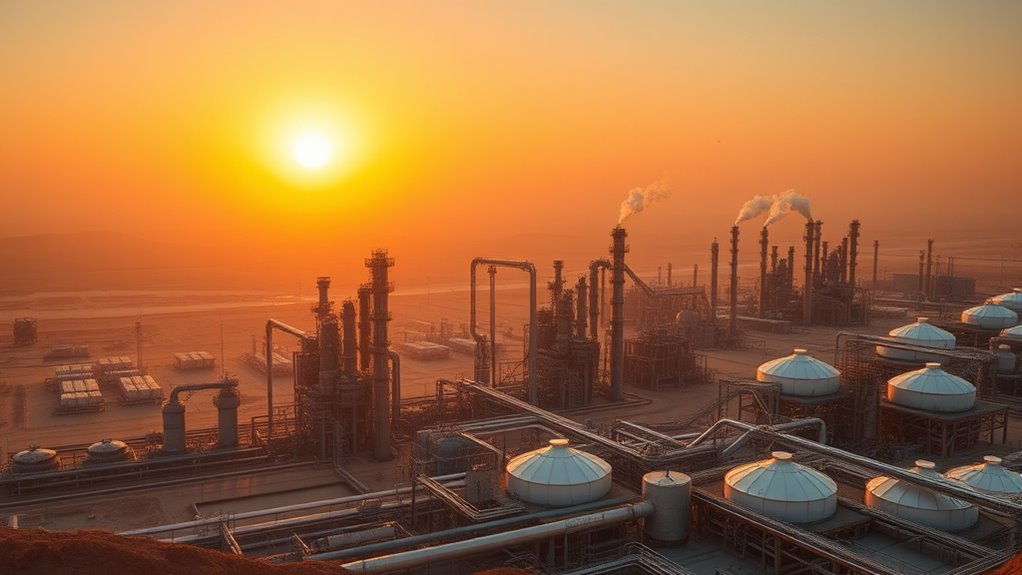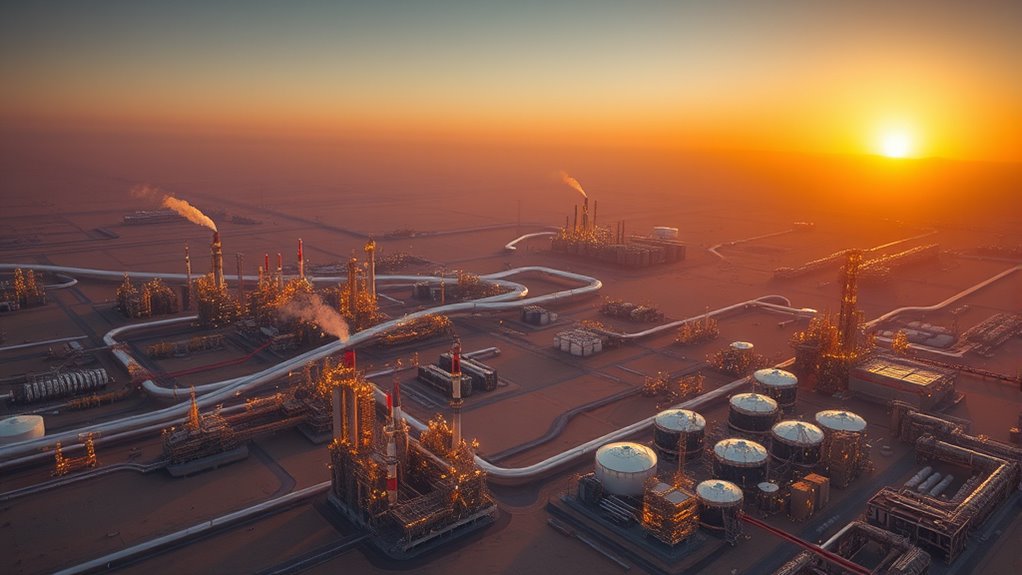The growth of petrochemicals in the Middle East has transformed the region into a global production hub, thanks to its abundant oil and gas reserves and efficient logistics networks. This expansion fuels regional economic development, but also brings environmental concerns like pollution and habitat loss. While the industry offers significant opportunities, balancing growth with sustainability remains a challenge. If you continue exploring, you’ll discover how the industry plans to innovate and address these issues for a sustainable future.
Key Takeaways
- The Middle East’s vast oil and gas reserves have driven rapid petrochemical industry growth, establishing it as a global production hub.
- Strategic geographic location and efficient logistics networks support stable supply chains and export capabilities.
- Industry expansion has boosted regional economies but raises environmental concerns like pollution and resource depletion.
- Supply chain stability and technological innovations are crucial for maintaining competitiveness amid potential disruptions.
- Increasing investments in cleaner technologies and sustainable practices aim to balance growth with environmental responsibility.

The Middle East’s petrochemical industry has experienced remarkable growth, transforming the region into a global hub for chemical production. As you explore this surge, you’ll notice that supply chain dynamics play a essential role. The region’s proximity to vast oil and gas reserves allows for streamlined extraction and transportation, giving companies a competitive edge. Efficient logistics networks, including pipelines and maritime routes, ensure raw materials flow smoothly from extraction sites to processing plants. This stability in supply chains reduces delays and costs, making Middle Eastern petrochemicals more attractive on the international market. However, this rapid expansion also introduces complexities. The interconnected nature of supply chains means disruptions—whether political, logistical, or environmental—can ripple through the industry, affecting production timelines and prices.
While you benefit from these efficient supply chain practices, it’s critical to recognize the environmental impact of this industry’s growth. The surge in petrochemical production inevitably leads to increased greenhouse gas emissions and pollution. Many plants operate with substantial energy consumption, often relying on fossil fuels, which exacerbates climate change concerns. The region’s rapid development has sometimes outpaced environmental safeguards, causing air and water contamination in nearby communities. As you observe these impacts, it’s clear that balancing economic growth with environmental responsibility remains a challenge. Governments and industry leaders are beginning to invest in cleaner technologies and stricter regulations, but progress varies across countries and companies.
You also need to understand that the environmental impact isn’t limited to emissions. The extraction and processing of hydrocarbons can lead to habitat destruction and water resource depletion. Waste disposal from petrochemical plants can threaten local ecosystems if not managed properly. Additionally, integrating sustainable practices into industry operations could mitigate some of these adverse effects and support long-term growth. As you consider the industry’s future, it’s important to recognize that sustainable practices could shape the region’s long-term viability. Innovations in green chemistry and renewable energy integration are emerging, promising to mitigate some of these adverse effects. However, implementing such solutions requires substantial investment and a shift in industry mindset.
Frequently Asked Questions
How Do Geopolitical Tensions Affect Petrochemical Investments in the Middle East?
Geopolitical tensions directly impact your petrochemical investments in the Middle East by increasing risks and creating uncertainty. When stability falters, you might face disrupted supply chains, fluctuating prices, and delayed projects. These factors make it harder for you to plan long-term, and your investments become more vulnerable to regional conflicts. Ensuring geopolitical stability is vital if you want to minimize investment risks and maximize returns in this dynamic industry.
What Environmental Challenges Are Associated With Expanding Petrochemical Industries?
Expanding petrochemical industries can turn your environment into a ticking time bomb. You’ll face serious challenges like air pollution, which clouds skies and harms health, and water contamination, risking ecosystems and drinking water sources. These issues threaten sustainability and community well-being. To grow responsibly, you must prioritize cleaner technologies and strict regulations, or else risk turning natural resources into casualties of your industrial expansion.
How Do Local Communities Benefit From Petrochemical Industry Growth?
You benefit from petrochemical industry growth through increased community benefits like improved infrastructure, healthcare, and education. The expansion creates numerous employment opportunities, allowing you to find jobs locally and support your family’s financial stability. As industries grow, they often invest in community projects and social programs, enhancing your quality of life. This growth can foster economic development, making your community more vibrant and resilient.
What Technological Innovations Are Driving Petrochemical Production Efficiency?
You see that over 60% of petrochemical plants now use advanced catalytic processes, boosting efficiency markedly. Digital manufacturing also plays a key role, optimizing production through real-time data and automation. These innovations reduce costs, increase yields, and lower environmental impact. By adopting advanced catalytic processes and digital manufacturing, you can improve petrochemical production efficiency, making your operations more competitive and sustainable in a rapidly evolving industry.
How Is the Middle East Diversifying Its Economy Beyond Petrochemicals?
You’re seeing the Middle East diversify its economy by investing in renewable energy projects like solar and wind, reducing reliance on oil. Additionally, countries promote cultural tourism, showcasing historic sites and modern attractions to boost visitors and create new revenue streams. These efforts help balance economic growth, create jobs, and reduce environmental impact, ensuring a more sustainable future beyond petrochemicals.
Conclusion
You can see how the Middle East’s petrochemical industry is booming, with the region’s capacity expected to grow by over 50% in the next decade. This surge will solidify its position as a global leader, creating countless opportunities. Imagine, by 2030, the Middle East could produce nearly 200 million tons of petrochemicals annually—transforming the economic landscape and shaping the future of the industry. The ascent is truly unstoppable.









